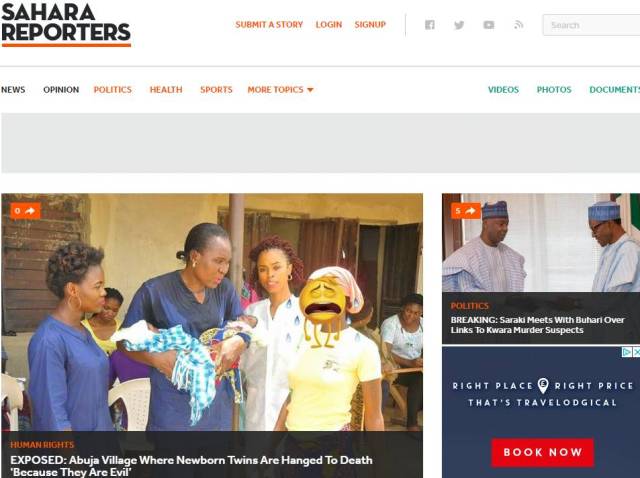 Sahara Reporters is run out of the USA, but has a good network inside Nigeria. [website of Sahara Reporters news]
Sahara Reporters is run out of the USA, but has a good network inside Nigeria. [website of Sahara Reporters news]
[This is an excerpt from an article in the special edition of The Round Table: The Commonwealth Journal of International Affairs on media freedom across the Commonwealth]
Traditional printed newspapers now have small and elite readerships and most Nigerians are getting their information from broadcasters, and from social media on their smartphones. The drop in sales of print editions can be illustrated by the Daily Times of Lagos, said to have sales of 225,000 in 1979, a paper which collapsed entirely amid scandals in the democratic era; in 2017, after a revival, its website claimed that with Indian print equipment it would be able to produce 125,000 copies daily. But a knowledgeable observer believes that the four strongest papers may not be selling more than 15,000 copies each—in a population of up to 200 million. The economic crisis enveloping the country in 2016–2017, with a halving of the oil price, also took its toll. In 2016, Naij.com, one of the more reliable sites, reported that The Guardian of Lagos was firing its managing director and 150 workers in an effort to survive.
Investigative weeklies such as Newswatch and Tell are no longer contributing effectively to public debate and the online news sites face the same problems that exist in Europe and North America: it is hard to generate the advertising revenue that would permit the employment of quality journalists who are given time to research a story. Newswatch no longer exists. Tell only has an online presence. Virtually all newspapers, still bought and sold for political or business reasons, now have their online versions. Changes came quickly even in the North, where media culture has always been different from the more progressive South; Andrew Walker, who worked there for some years, says that it is common to bury the point of a story well down the column. In 2006, journalists on the northern paper, Daily Trust, were still using fax and had to buy their own mobile phones. By 2010, the Daily Trust had a Facebook page.
Some print journalists have tried to use the opportunities of a more open polity to strike out in new directions. The best example was 234NEXT, launched on Twitter in 2009, then print-based and closed in 2011 when staff were owed five months’ wages. The brain behind it was Dele Olojede, one of the founding journalists of Newswatch with Dele Giwa, who moved to the USA and won a Pulitzer Prize for reporting the Rwanda genocide for Newsday. He promised to pay NEXT journalists a proper salary—at a time when many got the equivalent of £150 a month, often from businessmen or politicians—and tackled corruption and the secrecy surrounding Yar’Adua’s mortal illness. But his revenue model did not work, and the venture failed amid recriminations and alleged mismanagement. Some of the journalists moved on to Premium Times, a website.
The phenomenon of ‘citizen journalism’—basically the use of a smartphone to tell a story and upload a picture by people with no formal training or necessary commitment to objectivity—has led mainstream media into both scoops and apologies. When the Buhari government in 2016 proposed controls to regulate social media, the reaction was so sharp that the idea was abandoned.
Broadcasting is more diverse than it was in the military era, in spite of the influence of the federal government on the Nigerian Television Authority and the dominance of state governments on broadcasters in the 36 states. Independent, private stations are subject to an ombudsman required to ensure fairness. The Obasanjo presidency—with two terms from 1999 to 2007—sold off FM radio licences, but prevented the BBC Hausa service, now online, from having one. This BBC service maintains its reputation for reliability throughout the 19 Hausa-speaking states of northern Nigeria. Two independent television stations- cum-news sites have won a reputation: Sahara Reporters and Channels TV. Sahara Reporters is run out of the USA, but has a good network inside the country. Channels is run out of Abuja. Omoyele Sowore, Sahara’s publisher, was briefly arrested in Lagos in January 2017 after accusing a man of money laundering, who then claimed criminal defamation. In fact, throughout the media, there are more threats of libel and other legal actions than are ever brought to court.
In all this, it remains a fact that journalists are poorly paid and poorly trained. There is a Nigerian Institute of Journalism in Lagos, but it never opened a branch in the North. The Lagos University school of journalism became a department of mass communications. There is a Nigerian Union of Journalists, and the Nigerian Press Council, whose legal situation was amended in 1999 with the return of democracy, exists to handle complaints from the public but does not cover all sites or media. While some publishers and editors have waxed rich on subsidies, and a ‘journalists’ village’ in Ogun State contains houses occupied by a few working journalists, the economic and ethical situation of the media at large remains precarious. Journalists do not stay in the profession for long and, for example in Bauchi, they can be dependent on handouts from Government House at the state level.



